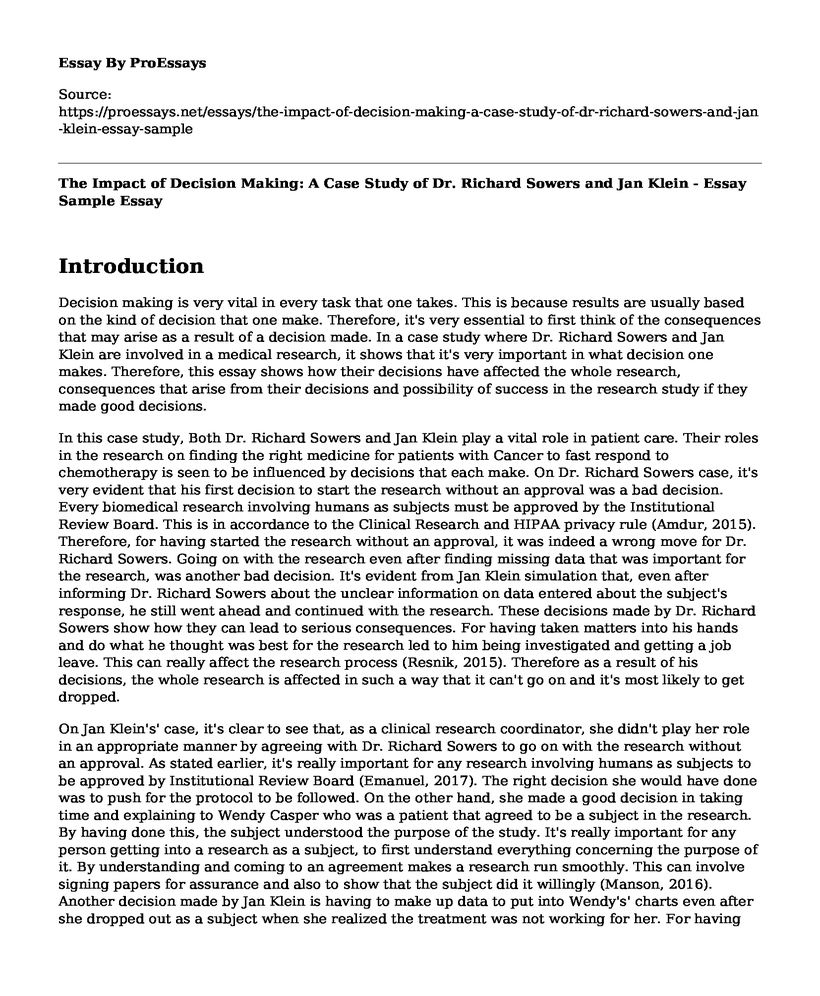Introduction
Decision making is very vital in every task that one takes. This is because results are usually based on the kind of decision that one make. Therefore, it's very essential to first think of the consequences that may arise as a result of a decision made. In a case study where Dr. Richard Sowers and Jan Klein are involved in a medical research, it shows that it's very important in what decision one makes. Therefore, this essay shows how their decisions have affected the whole research, consequences that arise from their decisions and possibility of success in the research study if they made good decisions.
In this case study, Both Dr. Richard Sowers and Jan Klein play a vital role in patient care. Their roles in the research on finding the right medicine for patients with Cancer to fast respond to chemotherapy is seen to be influenced by decisions that each make. On Dr. Richard Sowers case, it's very evident that his first decision to start the research without an approval was a bad decision. Every biomedical research involving humans as subjects must be approved by the Institutional Review Board. This is in accordance to the Clinical Research and HIPAA privacy rule (Amdur, 2015). Therefore, for having started the research without an approval, it was indeed a wrong move for Dr. Richard Sowers. Going on with the research even after finding missing data that was important for the research, was another bad decision. It's evident from Jan Klein simulation that, even after informing Dr. Richard Sowers about the unclear information on data entered about the subject's response, he still went ahead and continued with the research. These decisions made by Dr. Richard Sowers show how they can lead to serious consequences. For having taken matters into his hands and do what he thought was best for the research led to him being investigated and getting a job leave. This can really affect the research process (Resnik, 2015). Therefore as a result of his decisions, the whole research is affected in such a way that it can't go on and it's most likely to get dropped.
On Jan Klein's' case, it's clear to see that, as a clinical research coordinator, she didn't play her role in an appropriate manner by agreeing with Dr. Richard Sowers to go on with the research without an approval. As stated earlier, it's really important for any research involving humans as subjects to be approved by Institutional Review Board (Emanuel, 2017). The right decision she would have done was to push for the protocol to be followed. On the other hand, she made a good decision in taking time and explaining to Wendy Casper who was a patient that agreed to be a subject in the research. By having done this, the subject understood the purpose of the study. It's really important for any person getting into a research as a subject, to first understand everything concerning the purpose of it. By understanding and coming to an agreement makes a research run smoothly. This can involve signing papers for assurance and also to show that the subject did it willingly (Manson, 2016). Another decision made by Jan Klein is having to make up data to put into Wendy's' charts even after she dropped out as a subject when she realized the treatment was not working for her. For having done this, it resulted to distortion of information thus affecting the whole research. After the Institutional Review board came to know of the research, they asked for data collected and found that it was even done wrongly. Jane Klein had feed wrong data and this led to Jane being put on a job leave and the research being dropped.
Therefore it's really essential to make right decision when carrying out a task. In such a case study, it's clear that, it's vital in following protocols put in place to avoid unwanted outcomes. By doing this, one is able to avoid making bad decisions that lead to serious problems.
References
Amdur, R. J. (2015). Institutional review board approval and publication of human research results. JAMA: The Journal of the American Medical Association, 277(11), 909-914. Doi:10.1001/jama.277.11.909
Emanuel, E. J., Wood, A., Fleischman, A., Bowen, A., Getz, K. A., Grady, C., Sugarman, J. (2017). Oversight of Human Participants Research: Identifying Problems to Evaluate Reform Proposals. Annals of Internal Medicine, 141(4), 282. Doi: 10.7326/0003-4819-141-4-200408170-00008
Manson, S. M., Garroutte, E., Goins, R. T., & Henderson, P. N. (2016). Access, Relevance, and Control in the Research Process. Journal of Aging and Health, 16(5_suppl), 58S-77S. Doi: 10.1177/0898264304268149
Resnik, D. B. (2015). Conflict of Interest in Medical Research, Education, and Practice Institute of Medicine, Committee on Conflict of Interest in Medical Research, Education, and Practice, edited by Bernard Lo and Marilyn J. Field. Washington, DC: National Academies Press, 2009. 440 pp. ISBN: 978-0-309-13188-9, $54.95. Environmental Health Perspectives, 118(2). Doi:10.1289/ehp.118-a92
Cite this page
The Impact of Decision Making: A Case Study of Dr. Richard Sowers and Jan Klein - Essay Sample. (2023, Feb 24). Retrieved from https://proessays.net/essays/the-impact-of-decision-making-a-case-study-of-dr-richard-sowers-and-jan-klein-essay-sample
If you are the original author of this essay and no longer wish to have it published on the ProEssays website, please click below to request its removal:
- Paper Example on Leisure Activities and Recreational Culture
- Paper Example on Enterprise Risk Management
- Incorporating the Evidence in Data-Driven Decision Making Essay
- Essay Sample on Business Level and Cooperation Level Strategies
- Be Good with People: Essay Sample on Key Leadership Skill in Global Economy
- Intellectual Leadership: Driving Innovation in Higher Education - Essay Sample
- Essay Example on Differentiation: A Vital Strategy for Market Leadership







